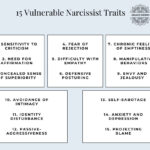10 Symptoms of Daughters of Narcissistic Mothers
Identifying the 10 symptoms of daughters of narcissistic mothers is crucial for understanding the complex dynamics of this challenging maternal relationship. This post delves into the signs that reveal the deep emotional impact and offers guidance for those navigating this difficult journey.
10 Signs & Symptoms in Daughters of Narcissistic Mothers
The signs and symptoms experienced by adult daughters of narcissistic mothers often manifest as complex emotional and psychological patterns that can deeply affect one’s sense of self and relationships:
1. Chronic Self-Doubt:
Chronic self-doubt in daughters of narcissistic mothers often stems from a history of being undermined and devalued. This persistent insecurity can infiltrate every decision, leaving a lasting imprint of inadequacy.
Such self-doubt is a common reflection of the constant criticism and lack of support from a narcissist mother, shaping a daughter’s inner voice to be one of a skeptic, always questioning her worth and capabilities.
Breaking this cycle requires building a foundation of self-compassion and seeking affirming relationships that nurture confidence.
Related: 7 Signs of a Female Narcissist
2. Compromised Boundaries:
Compromised boundaries are a hallmark struggle for those raised by covert narcissist mothers. Daughters often find it challenging to establish a clear sense of where they end and their mother begins, leading to a life where personal space and autonomy are frequently invaded.
This lack of boundaries may result in an inability to advocate for personal needs or to say no, often due to fear of reprisal or the ingrained desire to maintain peace at any personal cost.
Learning to establish and enforce healthy boundaries is a critical step towards healing and self-empowerment.
Related: Setting Boundaries with a Narcissist
3. Intense Fear of Abandonment:
Daughters of narcissistic mothers may harbor an intense fear of abandonment, a byproduct of unstable maternal attachment. This fear often surfaces in adult relationships, presenting as anxiety over being left alone or an excessive need for reassurance.
This symptom goes beyond typical worries—rooted in early experiences of conditional love, it can lead to clingy behavior or staying in unhealthy relationships.
Addressing these fears through narcissistic abuse therapy can foster security and independence.
4. Perfectionism:
Perfectionism in daughters of narcissistic mothers often arises from the pressure to meet unattainable standards. Constantly striving for perfection, they may believe that making any mistake will result in criticism or rejection.
This relentless drive can lead to significant stress and a harsh inner critic, echoing the judgmental voice of a narcissist mother. Healing involves embracing one’s imperfections and understanding that self-worth is not tied to flawless performance.
Related: 10 Symptoms of Daughters of Narcissistic Fathers
5. Codependency:
Codependency often surfaces in daughters of narcissistic mothers as an adaptive response to their upbringing. They may find themselves excessively emotionally reliant on others, mirroring the enmeshed relationship experienced with their narcissist mom.
This can lead to a pattern where self-value is inextricably linked to the ability to meet others’ needs, often neglecting their own.
Breaking free requires recognizing one’s worth independently and fostering self-reliance, challenging the deep-seated belief that their worth is measured by others’ approval.
Related: Codependency Affirmations
6. Hyper-Vigilance:
Hyper-vigilance is frequently a response to the unpredictable nature of narcissistic mother traits. Daughters may constantly anticipate criticism as explained in the narcissist prayer, a poem that unveils the damaging effects of narcissistic behavior. They may also experience emotional outbursts, leading to an exhausting state of alertness.
This vigilance is a survival tactic, honed from years of needing to be acutely attuned to the mother’s moods and reactions to avoid conflict.
Healing involves learning to lower guards and understanding that not all environments are as volatile as the one with their narcissistic mother.
7. People-Pleasing:
People-pleasing behavior is often deeply ingrained in daughters raised by mothers who exhibit signs of narcissism. These daughters may find themselves constantly prioritizing others’ needs and desires over their own, a pattern learned from attempting to appease a narcissistic mother.
Such behavior can lead to a loss of personal identity and neglect of one’s own needs. Recognizing and understanding the signs of a narcissistic mother can be the first step towards shifting away from people-pleasing and towards healthier self-assertiveness.
8. Emotional Suppression:
Emotional suppression is a common defense mechanism for those whose mom is narcissistic. This behavior often develops as a way to avoid the volatility and manipulation associated with a narcissist’s reactions to genuine feelings.
Daughters may learn to mute their emotions, perceiving the expression of feelings as a vulnerability. Over time, this can lead to a disconnection from their emotional selves.
Acknowledging and processing repressed emotions is a crucial step towards healing from narcissistic abuse and fostering authentic connections.
9. Echoism:
Echoism can emerge in those who grew up hearing the things narcissistic mothers say, which often diminish and invalidate.
It’s a condition where the individual doesn’t feel entitled to have a voice, mirroring the narcissistic mother’s behavior of overshadowing and not acknowledging their child’s needs and opinions.
Having a muted sense of self and avoid the spotlight to not trigger disapproval is another common symptom of daughters of narcissistic mothers. Recognizing this pattern is the first step in finding one’s voice and reclaiming a sense of identity.
10. Vulnerability in Relationships:
Vulnerability in relationships is common among daughters of narcissistic mothers, marked by a hesitancy to trust and a fear of intimacy.
These daughters may struggle with the belief that showing vulnerability equates to weakness, expecting rejection or manipulation as they might have experienced in their maternal relationship.
Learning to navigate this vulnerability involves understanding that healthy relationships are built on mutual trust and respect, and that it’s safe to express emotions and needs with the right people.
How Daughters of Narcissistic Mothers Can Cope with their Symptoms
Understanding and coping with the symptoms of having a narcissistic mother is a journey towards healing. Here are targeted strategies to help navigate this path:
- Seek Professional Therapy: A therapist can provide tailored strategies for recovery.
- Establish Clear Boundaries: Learn to set and maintain healthy limits in relationships.
- Cultivate Self-Care: Prioritize your well-being through activities that foster self-love.
- Educate Yourself: Knowledge is power. Read more about the influence of a narcissistic mother and learn about self-healing from narcissistic abuse.
- Build a Support System: Connect with friends or groups who understand and support your experiences.
- Practice Mindfulness: Techniques like meditation can help stay grounded and reduce stress.
Final Thoughts on the 10 Symptoms of Daughters of Narcissistic Mothers
Confronting the reality of having a narcissistic mother can be daunting. Yet understanding these 10 symptoms is a powerful step towards reclaiming your life.
It’s a path of self-discovery, boundary-setting, and seeking joy beyond the shadow of a challenging upbringing.
As you reflect on these symptoms, remember that each step forward is a move towards a healthier, more autonomous self.
If you’re interested in healing from narcissistic abuse, I warmly welcome you to my Narcissistic Abuse Recovery Program. It’s an easy self-paced online course which you can do at your own pace. My signature program combines scientific and spiritual tools for holistic healing of the body, mind, and spirit.
FAQs on Symptoms of Daughters of Narcissistic Mothers
A narcissistic mother often undermines her daughter’s self-esteem, imposes unrealistic expectations, and may manipulate or belittle her to maintain control and superiority.
Growing up with a narcissistic mother can lead to issues with self-worth, difficulties in trusting others, and emotional regulation challenges, often necessitating a journey towards healing in adulthood.
The scapegoat of a narcissistic mother is the child who is blamed for the family’s problems, often criticized and punished, while siblings may be idealized, creating a toxic family dynamic.






